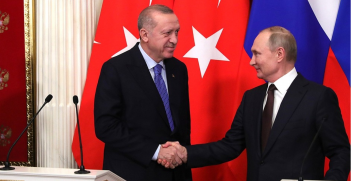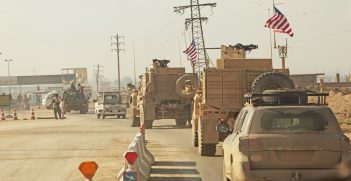Hidden Vulnerability of Erdogan's Divided Turkey

With the largest trial of suspected coup-plotters now underway, Turkish President Erdogan’s post-coup crackdown has given him an apparently firm grip on power. But is he more vulnerable than he appears?
In the year since the failed military coup, Turkey’s political system has been altered by a profound authoritarian shift. President Recep Tayyip Erdoğan has overseen a massive purge of 150,000 members of the military, judiciary, media, public service and academia. At least 50,000 people have been arrested following the coup.
Indeed, Turkey now has more journalists in prison than any other country. Meanwhile, in April a narrow majority of voters approved a transformation of the country’s parliamentary system into a presidential one in a constitutional referendum. It granted Erdoğan extensive new powers, including that the office of prime minister will be abolished at the next election (2019), making the formerly ceremonial presidency the dominant political office.
To justify the consolidation, Erdoğan has blamed the coup on the country’s Gülenist religious order. Accustomed to operating in the shadows of Turkey’s traditionally secular political tradition, followers of cleric Fethullah Gülen have been accused of seeking to influence the Turkish state by acquiring jobs in the judiciary and the police. One-time political allies of Erdoğan’s own Justice and Development Party (AKP), the two fell out around 2013 as part of a wider political power struggle.
It may be that this coup attempt was a desperate attempt by Gülenists in the military to seize power and avoid being purged; the precise details from last year remain opaque. Nevertheless, the fact that Erdoğan has successfully promulgated a narrative of single blame serves to justify the purges of Turkey’s institutions in the name of combating the Gülenist menace.
But while Erdoğan’s power grows and channels of dissent contract, the narrow result of the April referendum suggests Erdoğan is far from omnipotent. Examining his increasing control of the state reveals the exclusionary nature of the contemporary Turkish state which, combined with a turbulent foreign policy space, could threaten his grip on power.
From Kemalism to Erdoğanism
The AKP–Gülenist conflict is indicative of a broader problem in Turkey: the state has historically failed to incorporate all its members effectively. Indeed, the model Erdoğan is overwriting today is the legacy of the last figure to dominate Turkish politics to such an extent: Mustafa Kemal Atatürk. The World War I military hero Atatürk consolidated the modern Turkish state from the ashes of the Ottoman Empire. He sought to redress Turkish “backwardness” by forcing the country to modernise along the secular Western model.
Problematically, pious Turks, as well as the country’s large Kurdish minority, did not fit into this exclusionary model. Regular coups by the fiercely secular military kept the Kemalist framework intact, but only for a time. Economic liberalisation under Prime Minister Turgut Özal during the 1980s empowered a new business elite in the Anatolian countryside. These rural Turks were overwhelmingly pious—the seeds of the AKP—and while they embraced Turkey’s economic opening for personal gain, they retained conservative Islamic social and political values.
This marked the beginning of the end for the Kemalist model. The AKP benefitted from better political organisation than others and seized power in the 2002 elections. With Abdullah Gül as prime minister before Erdoğan stepped into the role in 2003, the AKP sought to consolidate its gains by bringing Turkish society more in line with its own pious roots, while continuing economic liberalisation and looking towards the ambitious goal of EU membership.
The need for political support at this time made the Gülenists, as fellow Islamists, natural allies for the AKP in its mission to empower religious Turks. But even after a crushing AKP electoral victory in 2007, which dealt a resounding blow to advocates of secularism, political divisions became more prominent. Ideological polarisation endured in Turkey, with the only difference being a sudden reversal in who had control over the state. The Kurds remained political outsiders, and the bloody insurgency that has been fought since 1984 by the PKK—the Kurdish military wing—remains a festering wound.
Much has been written about the AKP’s falling out with the Gülenists in 2013. By attacking state institutions perceived to be under Gülenist control, Erdoğan and the AKP damaged the democratic nature of the state. This in turn contributed to the worsening of divisions in Turkish society. While the coup is ironically a convenient pretext to accelerate the purges, this consolidation of power only exacerbates the problem. Complicating matters further are several major foreign policy challenges, the mismanagement of which could complicate an already fraught political agenda.
Wrangling with the West
At home, Erdoğan blames the Gülen movement for last year’s coup, but he has also criticised Western countries for not enthusiastically backing his version of events. In part, this is an attempt to generate the ‘rally around the flag’ phenomenon of increased domestic support at a time of crisis. The risk is that such antagonism backfires.
The US has so far refused to extradite Fethullah Gülen from his self-imposed exile in Pennsylvania, citing insufficient evidence. This sticking point hampers much-needed military coordination in Syria, where interests are already divergent.
Kurdish YGP forces are key to US efforts to dislodge Islamic State, whereas Turkey’s top priority is to prevent the emergence of a contiguous Kurdish enclave. Turkey’s failure to cooperate on shaping the future of Syria may renew a secessionist drive from Turkey’s own Kurds, who number as many as 20 million.
On the European front, a worsening spat with Germany threatens the dream of EU membership that drove Erdoğan’s economic and political agenda for much of the early 21st century. Turkey has detained 10 German and dual nationals, likely seeking the extradition of purged generals seeking asylum in Germany.
Germany has not backed down. German foreign minister Sigmar Gabriel issued a tough travel advice for Turkey and indicated a review of export credit guarantees and EU aid. This dispute has sowed further discord in AKP ranks, with Prime Minister Binali Yıldırım appealing for moderation while Erdoğan remains defiant. At a time of introspection for an EU distracted by Brexit and illiberalism at home, Turkish membership looks extremely unlikely.
The Qatar connection
The outlook across the Middle East is equally tense. Turkey rushed to aid Qatar in its ongoing feud with four Arab states. Their alignment in recent years came as both supported Islamist groups in the wake of the Arab Spring, notably the Muslim Brotherhood.
Turkey, for its part, looked to restore its former glory by positioning itself as a leader of Sunni Islam in a new Middle East. This regional influence agenda is now in tatters: the Muslim Brotherhood was ousted in Egypt and replaced with a strong man who allied with Saudi Arabia and rolled back the democratic gains of 2011. It is these countries that, now ascendant, have Qatar in their sights.
Turkey is in a tough position. Erdoğan has sought to play a conciliatory role but is yet to achieve any progress. With a military base in Qatar, Turkey is not ideally placed to act as an impartial interlocutor. Furthermore, the stakes are high: Turkey does not want to risk losing billions of dollars of Saudi and Emirati investment inflows.
Contemplating the strong man
Despite successfully entrenching himself as the dominant figure in Turkish politics, Erdoğan’s power has come at the expense of the nation’s unity and democracy. While opponents struggle to organise in a closed political culture, he has managed to consolidate his control. The risk for Turkey is that mismanagement of simmering foreign policy challenges threatens to expose some of the divisions in society. This is particularly applicable in the economic sphere, where diplomatic crises could spell uncertainty or worse by eroding support for AKP among key economic actors. Germany has threatened sanctions amid the current crisis.
The best path forward would be to use the coup not as an excuse to suppress all opposition, but rather as a prompt for national reconciliation. A refashioned, inclusive Turkish state could retain its conservative traditions while respecting the differences of its constituents. But how Erdogan chooses to exercise his new extensive powers will, of course, be up to him.
Hamish Whittle is an intern at the AIIA National Office and has an Honours degree in International Relations from the Australian National University.
This article is published under a Creative Commons Licence and may be republished with attribution.





